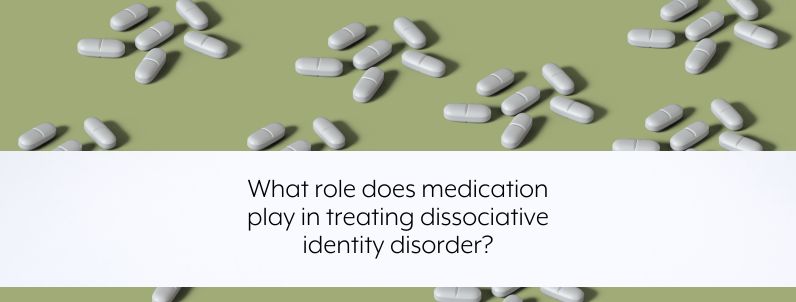
This fact sheet highlights some issues around medication and dissociative identity disorder but should not be construed as medical advice.
Dissociative identity disorder (DID) is a form of complex post-
There are no NICE guidelines for the treatment of dissociative identity disorder and so the guidelines of choice are those produced by the International Society for the Study of Trauma and Dissociation. The current version is the third revision, published in 2011:
International Society for the Study of Trauma and Dissociation (2011) ‘Guidelines for Treating dissociative identity disorder in Adults, Third Revision’, Journal of Trauma & Dissociation, 12:2, 115-
The quotes below are taken from these guidelines. Both the summary and full versions are available here.
Several sections of the Guidelines refer to the pharmacotherapy of dissociative identity disorder. In summary they say the following:
- Dissociative identity disorder patients can report different responses to the same medication when ‘alternate identities’ or ‘alternate personalities’ are in executive control of the body. Prescribers should beware of the danger of polypharmacy in this patient group.
- It is best to keep to an overall medication plan rather than chopping and changing: “dissociative identity disorder patients may have many day-
to- day symptom fluctuations that are due to the modulation of dissociative defences as well as their personal predicaments and life stresses. Thus, it is most helpful in changing or adjusting medications to attend to the overall ‘emotional climate’ of the patient’s presentation rather than trying to medicate the day- to- day psychological changes in ‘weather’.” (p.151) - Medication is not the primary focus of treatment: “Medications for dissociative identity disorder are usually best conceptualised as ‘shock absorbers’ rather than as curative interventions.” (p.151) Long-
term, individual psychotherapy is the treatment of choice for DID. - Medication can be helpfully used to ameliorate traumatic stress symptoms and comorbidities, rather than the dissociative identity disorder itself: “Pharmacotherapy for dissociative disorder patients typically targets the hyperarousal and intrusive symptoms of PTSD, and comorbid conditions such as affective disorders and obsessive-
compulsive symptoms, among others.” (p.150) - When dissociative identity disorder patients report hearing internal voices, these are usually the voices of their ‘alternate personalities’. Unless there is a co-
morbid psychotic disorder, these should not be treated with anti- psychotic medication: “Care must be taken to not confuse psychotic auditory hallucinations with the complex, personified, (mostly) inner voices described by DID patients that represent communications between alternate identities.” (p.153) - Neuroleptics are not generally recommended for treating dissociative identity disorder: “Hallucinatory phenomena in DID, even when alternate identities engage in command hallucinations mandating danger to self or others, are usually unaffected by even high-
dose neuroleptics … Instead, because of problematic side effects such as somnolence, neuroleptics may lead to decreased function rather than to the disappearance of voices.” (p.153) - Sleep problems are best treated where possible without resort to medication: “Sleep problems in dissociative identity disorder are usually best addressed in the overall framework of the treatment, using symptom management strategies for fearful alternate identities, negotiating sleep for nocturnal identities, and using trauma-
focused cognitive behavioural strategies to decrease PTSD reactivity at night, along with the judicious use of medications.” (p.153)
2 Comments
This has been most helpful and comforting. For a number of years the treatment I /we ended receiving was medication for schizophrenia,bi polar etc. Because of different alters reactions I /we were then made an involuntary patients now causing me to be cautious and fearful of all people in the health sector.
Really interesting read. Thanks! So glad l have finally discovered a useful and insightsful Facebook group which l can belong to.